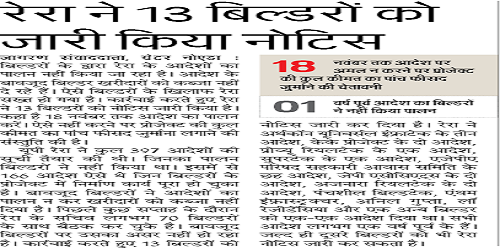Provisions that protect consumers are very basic and builders can still withdraw 30% of customer funds to buy land

It is difficult to run into somebody in Delhi you know and not have them confess that they too are caught with their money stuck in stalled real estate projects
in the suburbs of Noida and Gurugram. The bankruptcy process in the Jaypee Infratech Ltd case got the headlines,but the number of large developers in jail is not small.It includes companies such as Unitech, SRS Group and DB Reality, showing how deep the rot in real estate goes because rich people in India seldom go to jail for breaking the law.
Stuck in the still-to-be-Italian-marbled buildings are the savings of the urban mass affluent Indian who thought she was investing smartly in the property boom. Investors bought into the good deals offered by builders who offered to pay their first few EMIs (equated monthly instalments), who offered post dated cheques for those EMIs, who offered a free car if you booked a flat above a certain value. Real estate investors who bit the bait allowed themselves to believe deals too good to be true, to be true. They refused to listen to sane counsel of friends and newspaper articles that warned them against such deals.
But that was some years ago and builders seem to think that the memory of the big real estate crash is fading. The past few days have seen full page jacket ads of real estate companies that promise to pay your rent if you just give the first down payment for a future project. This time there is a sweetener in the deal—the project is RERA compliant. (RERA or Real Estate (Regulation and Development) Act, 2016 is the new real estate law that came into place on 1 May 2016, with one year given to states to formulate their own versions of the central law). Builders are increasingly using RERA compliance to sell projects.
RERA is India’s first serious attempt to regulate an industry not known for its ethical business practices. Compared to other countries, however, the RERA provisions that protect consumers are very basic and builders can still withdraw 30% of customer funds to buy land. Markets such as Dubai do not allow any such withdrawal from the escrow account created for the project.
But even this diluted RERA has been a non-starter in most states. In many states, including Haryana and West Bengal, the website of the regulator is still not in place, almost a year after the deadline got over on 1 May 2017. Other states have their website operational but with very thin content and useability. For example, Andhra Pradesh has its website up but has just two registered projects online. Worse, some state governments have diluted the RERA provisions on mandatory listing of under construction projects, to make it more builder friendly.
Real estate reform in India has been tough due to one primary reason—it is a sump for the black money that the nexus of the politician, bureaucrat, builder and broker generates. From buying cheap and then getting land use changed, to building roads and other infrastructure in certain areas, the location of airports are big money spinners for those inside the system. Non-tax paid income from other sources too finds its way into real estate, making the cash component of a second sale as high as 70% of the value. The political and administrative feet dragging has resulted in the big real estate crash that began around 2014 as prices soared to unsustainable levels.
As we look at the glossy ad push selling a dream reappear in our newspapers and digital media, should we believe the pitch again? Is it a good time to buy real estate? You need to remember three things about real estate.
One, while RERA is helping builders stay on course in the RERA compliant states, in other states, it is the wild-west still playing out. Stay away.
Two, even in the RERA compliant states, real estate prices are still too high. Real estate investors globally use a rough rule of thumb that says: buy at a yield of 10% and sell at 5%. The yield is the annual rent you will get from the property divided by its market price. A flat that costs Rs2 crore and rents at Rs35,000 a month has a yield of 2.1%. So, the return on your investment of Rs2 crore is 2.1%. You are better off in a fixed deposit post-tax. You are much better off in a debt fund. You are far better off in a long-term product like an equity fund.
Three, reconsider your real estate preference over financial products such as equity funds. Real estate and gold were products to buy when the market had few other options. You have moved ahead of your parents’ habits, world views and lifestyle, why stay stuck in a poor asset because your dad did? Treat real estate the way you treat any other long-term asset and apply the same metrics of cost, tax, return and holding period. Stop looking at returns from real estate point to point and feeling good about it. A doubling of your property value means little if it happened over 15 years. Learn to look at return on an investment on an annualised basis. If money has doubled over 15 years, you have made an average annual return of 4.7%. And this is pre-maintenance costs and taxes.
RERA is a big step forward in India to clean up the mess in real estate, but it will take time for all the states to comply with it and for the impact to bring order in the real estate market.
Source from:- https://www.livemint.com/Money/Ry6pTmRF6BbYumFDokl9cO/A-year-on-RERA-is-still-under-construction.html





